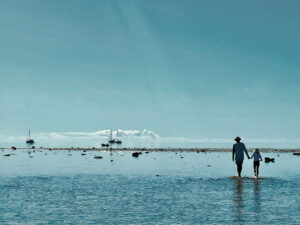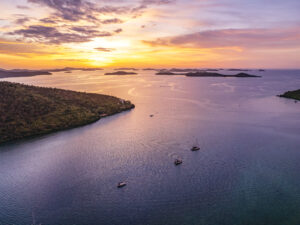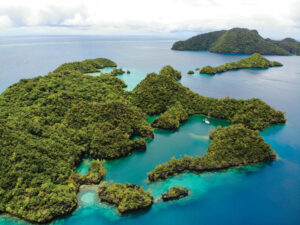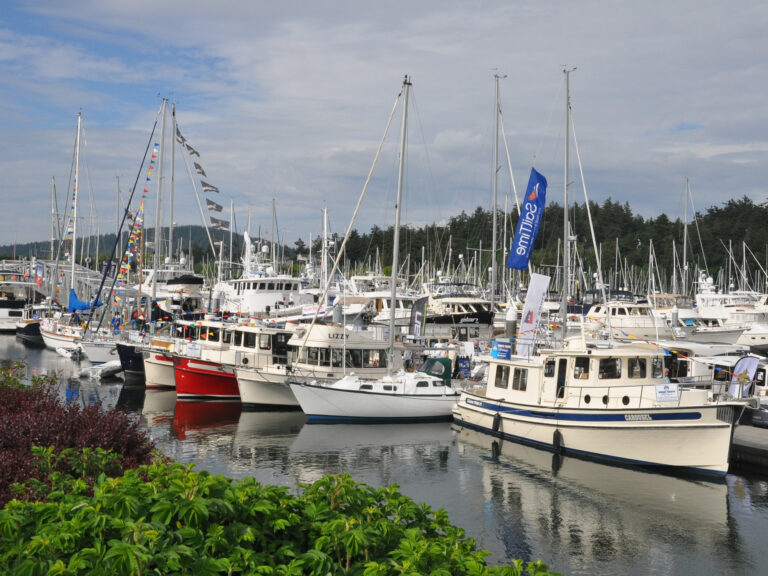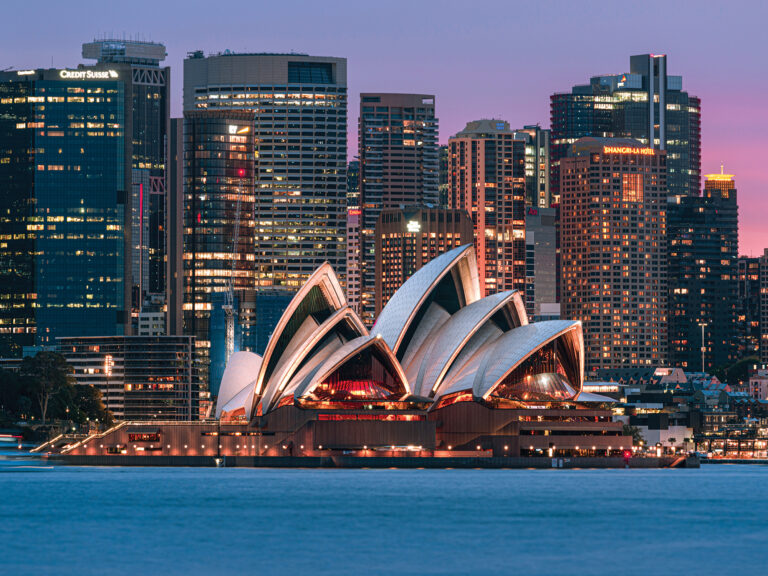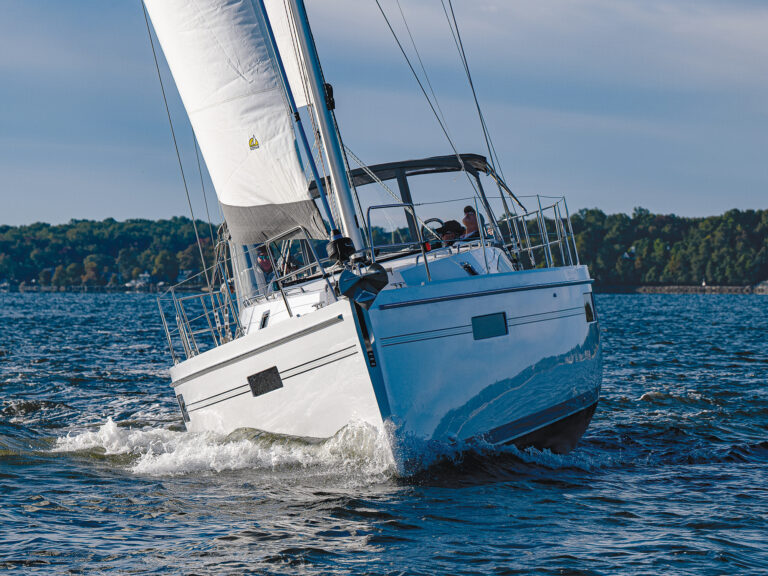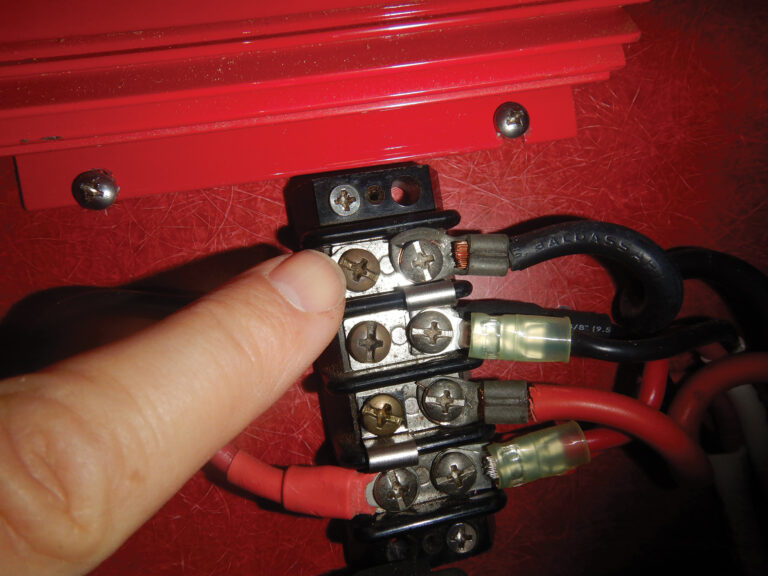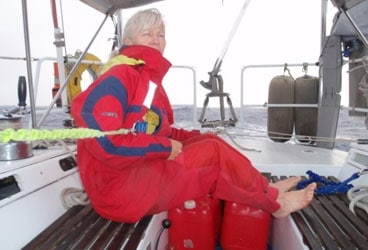
diana at the helm 368
In preparation for our voyage to Hawaii I invested much effort and too much money in an attempt to finally, after owning the Roger Henry for 17 years, find and fix every last possible point of seawater ingress, thus creating the mythical dry-as-a-bone dusty bilges one often reads about, but somehow never actually witnesses. I tore out and replaced the entire exhaust system, rebuilt the engine’s water pump, replaced the head hoses, greased the shaft packing-gland, meticulously checked every thru-hull fitting for even the slightest weep.
Before we slid out of beautiful Victoria Harbor I plugged the windlass hawsehole with plumber’s putty, thus sealing off the last of holes, valves, vents, hatches, cracks or crannies on the Roger Henry.
We slid through the Race Rocks on the ebb tide, but as that tide would not see us clear of Cape Flattery before turning foul, we decided to anchor for the night in Becher Bay on the south coast of Vancouver Island. There we could get a good night’s sleep and ride the next morning’s full ebb all the way out into the open Pacific Ocean.
The moment I was satisfied the anchor was well set, I rushed below and pulled up a floorboard to inspect the bilges for any trace of water. It was a thing of beauty-dry as the Arizona sands. Perhaps I was a little too pleased with myself, for I called to Diana, “I hope you have a good feather mop because the dust we’re going to get in this bilge could be a problem.”
That statement must have crossed the border that separates humor from hubris. Apparently, there’s a long history of the Gods punishing hubris. The next evening we were pounding into steep seas in a near gale off Cape Flattery. My stomach was where my mouth was supposed to be, and I was thinking that maybe I’d missed my calling in life, perhaps a farmer in flat, still, and ocean-less Iowa would have been a good choice.
That’s when Diana yelled to me. “Alvah, come quickly. The bilge is full of water!”
My mind raced, “How, what, where? I checked everything!”
Diana was more pro-active. She tasted the water.”It’s fresh,” she said. In one sense that was a relief, for this meant the mighty Pacific was not flooding in. On the other hand, we were well offshore, several weeks from Hawaii, and have no water-maker onboard. That was our life supporting, precious drinking supply sloshing around down there.
We tracked the problem back to a leak pouring out of the galley foot-pump. However green I was at the gills there was no choice. I pulled off and plugged the feed hose, then tore out and dissembled the complex little pump. I found a tear in the diaphragm, but fortunately we carried a replacement. After several hours with my feet in the air and head down in the bilge, the repaired pump was fastened back in place. I put away my tools and apologized to Diana for my language, which I should not blame on the French.
Nor should I blame Jimmy Cornell for his advice as to routing strategies from the Pacific Northwest to Hawaii. After all, his book, World Cruising Routes, does not come with a written guarantee, for it is a compilation of “averages” in regards to wind direction, strengths, and currents. In theory, by not heading off on the direct rhumb line for Hawaii, but by paralleling the North American coast as far south as San Francisco before curving west, we should have had prevailing northerly winds to ride down under the stationary Pacific High. These would feed us smartly into the steady-as-she-goes northeast trade winds.
I told Diana that all we would have to do was trim a sheet here and there, and decide what our first treat would be upon our speedy and imminent arrival in Hawaii. Trusting my judgment, she settled upon a big bowl of mango ice cream. Predictably, I envisioned a frosty adult beverage.Was I being slapped for my smugness? Those delights would have to wait, because we did not see so much as a breath of northerly winds for the next two weeks as we fought our way with sail and motor down towards the trades.
In fact our traditional halfway party, as measured in miles, did not occur until day fourteen at sea. It was a good party nevertheless. Absolutely everybody came. We treated ourselves to some exotic foods and the otherwise forbidden celebratory drink.
The voyage was pleasant in that we saw but two ships in three weeks, but depressing in that it was as easy to keep count of the seabirds as it was man made vessels. There seemed to be a tragic paucity of sea-life until on one moonlit night two enormous whales squeezed up to our hull on both sides, pressing in to form a V-shaped cradle around our hull. Perhaps they mistook us for a fatigued calf and they were trying to hold us up. For as thrilled as I was with their awesome might and proximity, I pulled out the life jackets in the event their gentle moods changed when they found us to be frauds.
As the days wore on, Diana and I fell into our old rhythms at sea. Four hours on, four off, passing on sailing and navigational information at the change of watch. Inevitably, Diana asks for a reef to be taken in the sails upon assuming command and I shake them out upon assuming my watch. The point is that the helmsperson feels comfortable with whatever sail plan they have to manage.
We always try to put sleep in the bank, so to speak, for when conditions inevitably worsen. Still, I usually awake from my afternoon nap an hour early; Diana stays up an hour later, so that we may share a meal and pass a couple of hours actually together.
Each noon I anxiously plotted our daily run. When we finally fell into a steady trade-wind pattern, the gaps between our daily fixes increased noticeably, even on the small-scale chart. The once daunting gap of 2,450 nautical miles between our position and the Hawaiian Islands dwindled to a seemingly manageable distance.
While plotting one particularly good noon-to-noon run, I was about to yell out to Diana, “At this pace you had better go get out a spoon, ’cause that mango ice cream is coming up quickly.” Then I remembered that fine border between humor and hubris, and looked up to those ever-vigilant gods who seem to monitor my every word.
I just said, “Well, there’s no point in predicting our ETA. It’ll just depend on the winds and our good luck.” I felt like they smiled on that sentiment, for the Roger Henry seemed to lift up and push just a little faster towards our Hawaiian landfall.

